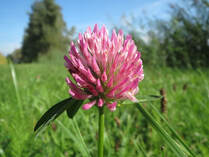
Uncomfortable symptoms experienced by many women during the menopause can be effectively managed with herbal medicines prescribed by medical herbalists. A recent study ( Link) shows that herbal treatment led to significant improvements for many women.
The menopause affects women in different ways and there is a wide range of symptoms of varying intensity. The study lists sixteen symptoms including hot flushes, mood swings, and joint pain.
Treatment with HRT prescribed by the GP is not a treatment choice for many women, either because it is contraindicated, or they prefer a more natural form of treatment. Many women want an effective alternative and one they feel comfortable taking for a longer duration.
Individual herbs such as black cohosh and red clover bought over the counter can relief menopausal symptoms but not everyone finds them beneficial and the evidence is contradictory. These are standardised formulations which do not meet the individual requirements of each woman.
The variation in women’s experience of the menopause supports the need for both a range of treatment and also the need for this to be tailored to each individual. The study showed how this was provided by a medical herbalist who, following a full consultation, selected several different herbs most beneficial to the patient.
The medical herbalist was able to respond to the needs of the patient and the symptoms experienced, and vary the herbal prescription and protocol accordingly. Selecting an individualised mixture of herbs also allows treatment of other organ systems that may be affected by the menopause and not just those associated with decreasing oestogen levels.
The women in the study reported not just an improvement in menopausal symptoms but improved wellbeing and the ability to carry out a chosen activity thus enhancing their quality of life.
More women need to be aware of the option of visiting a medical herbalist. Participants in the study stated that would have liked their doctor to have told them about visiting a qualified medical herbalist for herbal treatment, an option not currently mentioned in the NICE guidelines.
The menopause affects women in different ways and there is a wide range of symptoms of varying intensity. The study lists sixteen symptoms including hot flushes, mood swings, and joint pain.
Treatment with HRT prescribed by the GP is not a treatment choice for many women, either because it is contraindicated, or they prefer a more natural form of treatment. Many women want an effective alternative and one they feel comfortable taking for a longer duration.
Individual herbs such as black cohosh and red clover bought over the counter can relief menopausal symptoms but not everyone finds them beneficial and the evidence is contradictory. These are standardised formulations which do not meet the individual requirements of each woman.
The variation in women’s experience of the menopause supports the need for both a range of treatment and also the need for this to be tailored to each individual. The study showed how this was provided by a medical herbalist who, following a full consultation, selected several different herbs most beneficial to the patient.
The medical herbalist was able to respond to the needs of the patient and the symptoms experienced, and vary the herbal prescription and protocol accordingly. Selecting an individualised mixture of herbs also allows treatment of other organ systems that may be affected by the menopause and not just those associated with decreasing oestogen levels.
The women in the study reported not just an improvement in menopausal symptoms but improved wellbeing and the ability to carry out a chosen activity thus enhancing their quality of life.
More women need to be aware of the option of visiting a medical herbalist. Participants in the study stated that would have liked their doctor to have told them about visiting a qualified medical herbalist for herbal treatment, an option not currently mentioned in the NICE guidelines.
 RSS Feed
RSS Feed
